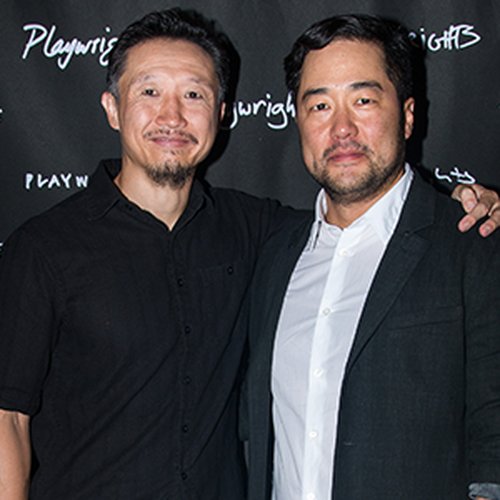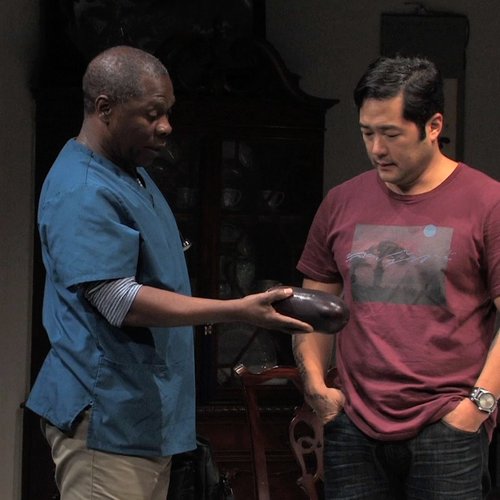The American Voice: Momentary Grace
By Sarah Lunnie, Literary Director

When Sah-Jin, the widowed immigrant mother in Julia Cho’s stirring, melancholic 99 Histories, describes a traumatic parting with the sister she last saw as a teenager in Korea, her story forms around the memory of food. She tells her adult daughter, Eunice:
“When I think of her, I think of fruit. One, a pale yellow fruit with ridges the length of your hand. She would peel it so quickly, long, see-through strands of skin. She would slice it into long thin canoes for me because she knew I liked it. Fruit never tastes as good as when it came from her hand. And the last time I saw her, she gave me a red, orange fruit, that had leaves on it like a little hat. Something like a tomato. Not much juice, a harsh sweetness. After eating it, my fingers were coated with a powder that had tiny edges. Like sand. Like glass. I waved good-bye to her with glass on my hands.”
There’s so much to savor in Cho’s language. I love the gorgeously evocative precision with which she conjures the sensory experience of these fruits whose English names Sah-Jin does not know, and the almost alarming efficiency with which those sensual details collapse the distance between the past and present. But I find I’m struck especially by the sly complexity of Sah-Jin’s gesture. Her story, it seems to me, is an elegant substitution: both an intimacy shared and a privacy maintained, an act of maternal generosity and of individual reserve, a confession and a sidestep. Eunice wants to know what happened to her aunt, about whom she knows almost nothing, but with whom, she has learned, she shares a legacy of mental illness. Sah-Jin responds to her daughter’s hunger for access to her life — but indirectly. Like the pinhole projector that lets you watch a solar eclipse, the memory of the fruit is a kind of protective dodge, a screen through which the women can safely view the blinding intensity of the past.
If food appears through that early work (Cho’s first) in glancing gestures, in Aubergine it is foregrounded. The first seed of this luminous, elegiac new play was written in response to a prompt from The Ground Floor at Berkeley Rep, who in 2012 commissioned Cho and 19 other playwrights to write “a sweeping cycle of short scripts that explore our intricate relationship with what we eat.” It isn’t hard to guess why they wanted her mind in the mix. Cho’s canon to date reflects a wide range of animating questions and preoccupations, but a recent dive into her anthology reminded me just how significant a place food occupies across her body of work. Mothers feed their children, hosts feed their guests, the living remember the dead through stories of the meals they cooked. Even where food is absent, its lack tells a story, the loss of appetite a marker for illness, heartbreak, or grief. Whoever is cooking or eating, food is quietly omnipresent — as ubiquitous as language itself, and itself a kind of language.
Even where food is absent, its lack tells a story, the loss of appetite a marker for illness, heartbreak, or grief.
Many of Cho’s plays concern themselves with history and memory, and the ways in which the two overlap and diverge. She’s a writer preoccupied with estrangement and reunion, with the conflicts and ambiguities that arise when past and present collide. In 99 Histories, Eunice, a onetime child cello prodigy whose adulthood has been marred by mental illness, returns to her childhood home to visit her mom and to make a decision about an unplanned pregnancy. As mother and daughter reckon with the losses that have marked their lives, Eunice attempts to uncover the truth about her mother’s youth in Korea. Here, as throughout Cho’s anthology, characters battle — with loved ones, with themselves — to understand what happened? And what did it mean? In The Winchester House, an ambivalent reunion sends V spinning through memories of a teenaged sexual encounter with a much older family friend. As the past rushes in, questions of responsibility, intention, the very meaning of her experience, only multiply, a solid sense of truth always maddeningly out of reach. And in Cho’s chillingly vertiginous The Piano Teacher, a retired music teacher’s nostalgic attempts to reconnect with her grown pupils spirals into infinitely murkier territory, as Mrs. K is made to confront the darker reaches of her late husband’s psyche and the damage he inflicted on her students. Food crops up again and again in all these stories, as ceremony, currency, comfort. Sah-Jin spends 99 Histories trying to feed Eunice, an expression of maternal care for the daughter she loves madly but with whom she struggles to connect; V recalls the family barbecues over which a complicated friendship was forged; in The Piano Teacher, Mrs. K anxiously devours cookies, not merely an indulgence, we come to detect, but a needful, almost ritualized avoidance.
Cho’s work almost always organizes itself around the family, which seems to represent a locus of misunderstanding and of mystery as often as a source of comfort and communion. In BFE, which ran here at Playwrights in 2005, a nowhere town in the desert sticks of Arizona is shaken by the disappearance of a spate of teenage girls — all of them blonde — at the hands of a serial killer. Against this anxious backdrop, Cho tells a story about Panny, a 14-year-old Korean-American girl who lives with her devoted but unfulfilled Uncle Lefty, and Isabel, her agoraphobic, plastic-surgery-addicted single mom. Panny’s sense of her own worth is being forged in a context in which a girl’s value is conflated with beauty and in which beauty is conflated with whiteness. Though not without humor, it’s a bleak, bleak play, full of false starts and abortive attempts at intimacy. The final tableau reunites this makeshift family, but theirs is an uneasy table: three restless souls adrift in the desert, looking for a place to land. But at the center of BFE’s arid landscape sits an unexpected, if illusory, oasis: an improvised meal, shared between Panny’s mom and a perfect stranger, which ushers in a momentary grace. “It just tastes so good,” says Isabel, pizza in her mouth. “Food tastes better when you eat it with someone, doesn’t it?”
Cho’s plays reflect, variously, a preoccupation with disappearance and return, or the impossibility of return — what can be saved, and what is lost forever? — and grapple with the paradoxical adjacency of emotional and spiritual extremes, the mysterious overlap of life’s light and dark places. Difficult parent-child relationships recur (as in, for instance, her father-son road trip drama Durango); many of her protagonists are adult children suspended between a desire to please or to fulfill expectation, and the need to live according to their own sense of truth, however quiet or tenuous it might be. She writes frequently (as in The Language Archive, where a linguist devoted to preserving dying languages is left reeling when his wife leaves him to bake bread) about the difficulty of communication, the need to make oneself understood. About caretaking, as an imperative and a ritual. And, again and again, about loss.
“It just tastes so good,” says Isabel, pizza in her mouth. “Food tastes better when you eat it with someone, doesn’t it?”
Cho wrote Aubergine after a several-years hiatus from writing, during which she returned with her family to the Arizona of her childhood, cared for her dying father, and lost a dear friend. It is, beautifully, a play about death and dying, about caregiving, about grace, about the paradoxical fullness of loss — and also, it seems, a play about hunger, in all its forms. As I read her descriptions of her process, and how that initial commission from Berkeley made it possible to write about her grief, I wonder if the prompt offered Cho, as the fruit did Sah-Jin, a kind of pinhole projector, a way to look at and translate her experience without burning her eyes.
And I keep returning to 99 Histories, struck by a feeling that this early work contains the roots for all the plays that have followed it. Eunice’s words at the end of that first play ring out like a tender prayer for all humanity in the face of our frailty, of the ultimate futility of all our efforts: “We took pictures of the wrong things / and we recorded the wrong events. / We told the wrong stories / and we remembered the wrong memories. / What has lasted is sadness; it will outlast flesh. / What has lasted is forgetfulness; it wins over memory every time.”
But Eunice holds, to the last, a quiet hope that life will not let her fall: “But sometimes,” she says, “in the blue hour, between midnight and dawn, I’ll wake up and my hands will be alive, moving over an imaginary cello all by themselves.” With Aubergine, more than a decade and many plays later, Julia Cho reenters that great space, between the immensity of time and the fragile tactility of our small lives, and locates — quietly, astonishingly — a kind of wholeness.


